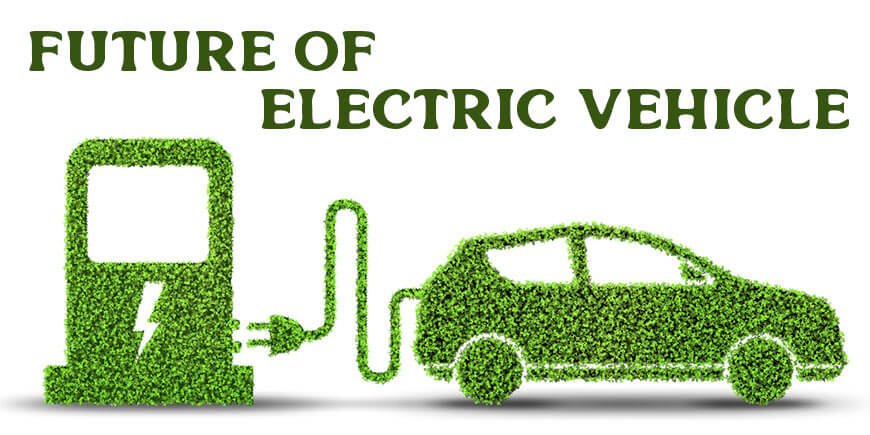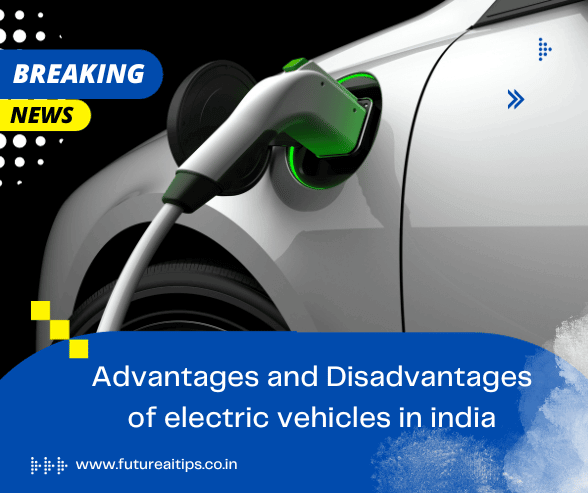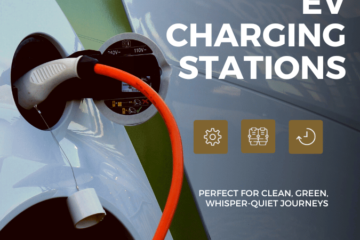Electric Vehicles: A Simple Guide to a Greener and advantages and disadvantages of electric vehicles in India.

Electric vehicles (EVs) are like regular cars, but they run on electricity instead of gasoline or diesel. In this blog, we’ll explore what electric vehicles are, how they work, their benefits, and why they’re essential for a cleaner, greener future.
What is EV?

An electric vehicle, or EV for short, is a car, truck, or even a scooter that uses electricity as its power source. Instead of a gas tank, EVs have a big battery that stores electricity. This battery powers an electric motor that turns the wheels and makes the vehicle go.
1. Vehicle Types:
Electric vehicles come in various forms, including cars, trucks, vans, and even scooters. The fundamental principle remains the same: they all use electricity as their primary power source. Here’s a closer look at some common types of EVs: benefits of electric vehicles in india
- Electric Cars (BEVs): These are the most common type of EVs. Electric cars, like the Tesla Model 3 or Nissan Leaf, are designed to be driven solely by electricity. They have no internal combustion engine (ICE), and their entire propulsion system is electric.
- Electric Trucks and Vans: Electric trucks and vans, such as the Tesla Cybertruck and the Ford E-Transit, offer the benefits of electric power for commercial and industrial purposes. They provide a clean and efficient way to transport goods and people.
- Electric Scooters and Bikes: Smaller electric vehicles like scooters and bicycles have become increasingly popular in urban areas for short-distance commuting. They often have compact electric motors and smaller batteries optimized for city travel.
2. Battery Technology:
The heart of an electric vehicle is its battery pack. These batteries are quite different from the small, disposable batteries used in everyday gadgets. Instead, EVs use high-capacity, rechargeable lithium-ion batteries:
- Lithium-Ion Batteries: These batteries are made up of multiple lithium-ion cells connected together. Lithium-ion batteries are chosen for their high energy density, which allows them to store a lot of electrical energy in a relatively small and lightweight package.
- Battery Management System (BMS): EVs include a sophisticated BMS that monitors the state of each cell within the battery pack. It ensures that the cells are charged and discharged evenly, maximizes battery life, and enhances safety. benefits of electric vehicles in india
3. Electric Motor:
Electric vehicles rely on electric motors to convert electrical energy from the battery into mechanical power that drives the wheels:
- Electric Drive System: The electric motor is connected to the vehicle’s wheels through a transmission or a direct-drive system. When you press the accelerator pedal, the motor receives electrical power from the battery, and it generates torque to turn the wheels.
- Regenerative Braking: Many EVs use regenerative braking, a technology that allows the electric motor to act as a generator when you apply the brakes. This converts kinetic energy back into electricity, which is then stored in the battery, improving efficiency and increasing driving range. advantages and disadvantages of electric vehicles in india
4. Charging Infrastructure:
Charging an EV is a simple process, but it relies on a network of charging infrastructure:
- Charging Stations: EV owners can charge their vehicles at charging stations, which come in various types and speeds. Public charging stations can be found in parking lots, along highways, and in urban areas, making it convenient for EV owners to charge their vehicles while out and about.
- Home Charging: Many EV owners install charging equipment at home, allowing them to charge their vehicles overnight or whenever it’s convenient. Home charging typically uses Level 1 or Level 2 chargers, depending on the electrical setup.
How Do Electric Vehicles Work?

Certainly, let’s dive into the working mechanism of electric vehicles (EVs) :
1. Battery Stores Electricity:
At the heart of an electric vehicle is a big battery. It’s like a super-sized version of the battery in your flashlight or phone. This battery stores electricity, just like your phone battery stores power.
2. Charging Up:
To make an EV go, you have to charge it, just like your phone needs charging. You plug the EV into a special charger. This charger sends electricity into the battery, filling it up, similar to how you plug your phone into a charger to fill up its battery.
3. Electricity Powers the Motor:
Inside the EV, there’s an electric motor. Think of it like the engine in a regular car, but it runs on electricity instead of gasoline. When you press the pedal to go, electricity from the battery flows to the motor. advantages and disadvantages of electric vehicles in india
4. Turning Electricity into Motion:
The electric motor is like a magic machine. It takes the electricity from the battery and turns it into spinning power. This spinning power is what makes the wheels of the EV turn. It’s like the motor spinning your bicycle wheels, but much more powerful. benefits of electric vehicles in india
5. No Gasoline Needed:
Here’s the cool part: EVs don’t need gasoline or diesel. They run purely on electricity. There’s no need to visit a gas station. This means they don’t produce tailpipe emissions like regular cars, making them better for the environment. advantages and disadvantages of electric vehicles in india
6. Regenerative Braking:
When you step on the brake pedal, something neat happens in an EV. It’s called regenerative braking. Instead of wasting energy as heat (like in regular brakes), the EV’s electric motor acts like a generator. It turns some of the energy back into electricity and sends it back to the battery, which helps you go farther on a charge. benefits of electric vehicles in india
7. Driving Range:
The distance an EV can go on one charge is called its driving range. It depends on the size of the battery and how you drive. Some EVs can go around 100 miles on a single charge, while others can go much farther, even over 300 miles. benefits of electric vehicles in india
8. Charging Options:
You can charge your EV in different ways. There are regular wall outlets, like the one you use for your phone, which are slower. Then, there are special chargers, like the ones at charging stations, which can charge your EV faster. It’s a bit like choosing between a slow or fast charger for your phone.
In a nutshell, electric vehicles work by storing electricity in a big battery, using that electricity to power an electric motor, and turning that power into motion to make the vehicle go. The best part? No gasoline needed, and they’re much cleaner for the environment!
Advantages of electric vehicles in india

- Clean and Green: EVs produce no tailpipe emissions, so they are better for the environment and reduce air pollution. benefits of electric vehicles in india
- Cost Savings: Charging an EV is often cheaper than filling up with gasoline, saving you money in the long run.
- Low Maintenance: EVs have fewer moving parts, which means less maintenance and fewer trips to the mechanic.
- Quiet and Smooth: Electric motors are quieter and provide a smoother ride compared to traditional engines.
- Energy Efficiency: Electric motors are more efficient at converting energy into motion, which means less energy waste.
- Instant Torque: EVs provide quick and powerful acceleration due to the instant torque from electric motors.
- Home Charging: You can charge your EV at home, making it convenient and eliminating the need to visit gas stations.
- Government Incentives: Many governments offer incentives, like tax credits, to encourage people to buy electric vehicles. benefits of electric vehicles in india
- Reduced Oil Dependence: EVs don’t rely on oil, which can help reduce a country’s dependence on imported oil.
- Advanced Technology: EVs often come with modern features, like touchscreen displays and advanced safety systems. benefits of electric vehicles in india
Disadvantages of electric vehicles in india
- Limited Range: Some EVs have a limited driving range on a single charge, which can be a drawback for long trips. disadvantages of electric vehicles in india
- Charging Infrastructure: In some areas, there may not be enough charging stations, making it inconvenient to charge your EV.
- Long Charging Times: Charging an EV can take longer than refueling a gasoline car, especially with slower chargers. disadvantages of electric vehicles in india
- Upfront Cost: EVs tend to be more expensive to buy initially, although this cost difference is decreasing over time.
- Battery Degradation: Over time, the battery’s capacity can decrease, affecting the range and performance of the EV.
- Limited Model Options: While the variety of EVs is growing, there are still fewer options compared to traditional cars. disadvantages of electric vehicles in india
- Electricity Source: The environmental benefits of EVs depend on the source of the electricity, which may not always be clean and green.
- Heating and Cooling: Using the heater or air conditioner in an EV can reduce its range because it uses electricity. disadvantages of electric vehicles in india
- Weight: EVs tend to be heavier than gasoline cars due to the weight of the battery, which can affect handling.
- Resale Value: Currently, the resale value of EVs may be lower than that of traditional cars, though this is changing as EVs become more popular.
Read More
- What is Deepfake AI | Is Deepfake legal in India
- How AI can helpful at Ram Mandir Ayodhya Safety on January 22, 2024
- How Infosys loses $1.5 billion AI contract from global customer
- What is RAG Model ? How does rag work ? Future of Technology
- What is LLM large language model | Important LLM’s in 2023
- What happens if you go on the dark web | Is dark web illegal in India 2023?










0 Comments